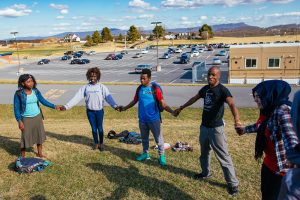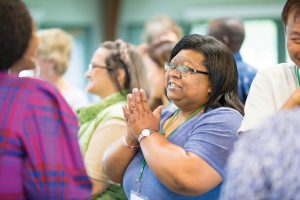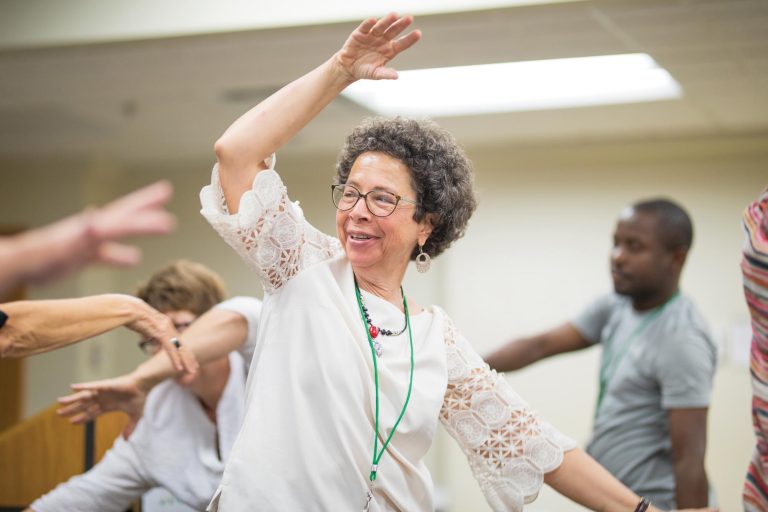For some participants, Strategies for Trauma Awareness and Resilience (STAR) I is an “entry point,” the first opportunity for an extended conversation about trauma and resilience, how traumagenic events can lead to cycles of violence, and personal and collective strategies for breaking free from those cycles.
[The STAR program began in the wake of the events of September 11, 2001, as a partnership between Church World Service and the Center for Justice and Peacebuilding at Eastern Mennonite University to equip community leaders to understand the dynamics of trauma and healing, and their linkage to issues of conflict, justice and peace.]
STAR II invites a deeper conversation, creating a space of commitment, shared language and values in which participants consider “the roles they will play in their lives, organizations or communities to interrupt the cycle,” said Katie Mansfield, the program’s lead trainer.
STAR II participants are coached through the creation of a contextualized action plan to facilitate learning with others who experienced trauma. Some participants – such as an experienced NGO trainer who wants to integrate trauma and resilience into multi-national programming – come into the training with a clear idea of how to apply STAR concepts. Others – perhaps a pastor who recognizes a need for trauma-informed religious retreat spaces – have an idea to explore. And still others, benefiting from the space and collaborative input, find their own niche that uses their skills and experience.
Four such STAR II participants – Melanie Snyder, Susan Lamb, Celeste Thomas and Talibah Aquil – are working to enact systemic change through the sharing of concepts related to trauma, resilience and trauma-informed care.
‘On my radar’

As executive director of the Lancaster County (Pennsylvania) Reentry Management Organization, Melanie Snyder leads a collaborative group of more than 50 organizations “working to build the foundation for a trauma-informed criminal justice system,” she explained.
“We find that the vast majority of the justice-involved people we serve have experienced significant trauma in their lives, both prior to their criminal justice system involvement, and also as a direct result of the processes associated with arrest, court processes, incarceration, reentry and criminal justice supervision,” she said. “So an understanding of trauma is essential to changing how the criminal justice system responds.”
Though she had known about STAR for about eight years, it wasn’t until a training was offered in Lancaster in March 2017 that she was able to attend. The following November she attended STAR II in Harrisonburg.
Both trainings augmented knowledge and skills she’d acquired over many years in the field, including in a recent year-long fellowship during which she studied trauma and trauma-informed communities in the Pacific Northwest and Canada.
Over the past 18 months, the reentry organization has trained more than 1,100 people across several community sectors about trauma, resilience and trauma-informed care, Snyder said. Approximately 400 participants were corrections officers and parole officers; others included police officers, attorneys in the public defender’s office, staff at a youth detention facility, children and youth workers, court-appointed special advocates, and other key stakeholders in the local criminal justice system. Integrated into the curriculum are STAR materials that focus on the neuroscience of trauma, the cycles of violence, and the “breaking free” snail model.
Experience repercussions of a community tragedy
Hesston Community Foundation director Susan Lamb found STAR after her community experienced a mass shooting in 2016. She attended both trainings and then wrote a grant proposal to bring the EMU-based STAR team to central Kansas to train first responders and those working in education, ministry and health and human services.
Personal impact aside, Lamb said, the 2016 shooting was “the most pivotal professional experience in my 38-year career.” She says that she continues “to have concerns about the manner in which we have communally failed to process this tragedy.”
In the months after the shooting, more than $150,000 was donated to the community foundation. As director, Lamb was responsible for determining the monetary distributions, and she saw an opportunity for her community: STAR. The program had provided her with a framework for understanding her own and other’s reactions, and relationships with other participants who encouraged her to continue prioritizing concepts of trauma, resiliency and trauma-informed care.
She knows firsthand how empowering the curriculum is. “I have found that my brain is full but my heart is fuller when I reflect about STAR,” she said.
Partners in exploring the legacy of slavery

Celeste Thomas brought a counselor’s insights to her STAR I training, having previously worked with survivors of domestic violence and sexual assault. As director of EMU’s Multicultural Student Services, she works with and empowers students of all cultures.
Thomas was drawn to the organizational focus of her STAR II training, but didn’t have a clear idea of how she might specifically use the training until she connected with former Peace Corps worker Talibah Aquil, who was entering her second year of graduate studies at CJP. The women found a common interest and concern in the sometimes tense relationships between African and African American people.
“Both of us had fruitful and hurtful experiences with African people in different contexts, Talibah in her work and me working with students of diverse cultures here in Virginia,” Thomas said. “We did some soul-searching and had some deep discussions around this disconnect, and decided we needed to take some action because it’s not healthy for any of us. We share a common ancestry, but there is a lot of distrust and misunderstanding that is complicated by today’s political and social environment. We should be supporting each other and drawing strength from each other, but we need to have conversations first.”
When the partners invite students into discussion groups this fall, Thomas said that STAR materials on understanding and unpacking historic harms will be particularly beneficial. A field trip to Charlottesville or Richmond to further explore issues of the legacy of slavery and white supremacy may culminate the series.
